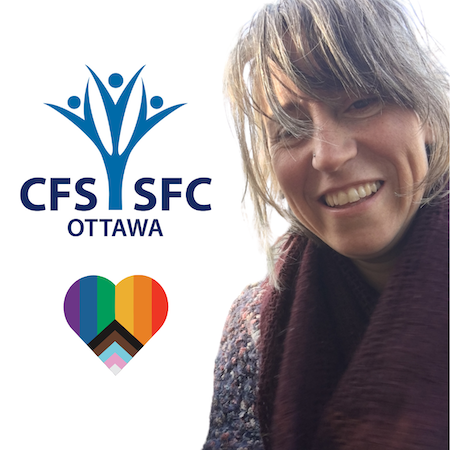Celebrating Black History Month by focusing on improving access to anti-racist mental health care
In February, Canada celebrates Black History Month. And in early March, Black Mental Health Week is celebrated in Ottawa. Both events are opportunities to celebrate the achievements and contributions of Black communities in Canada. They are also opportunities to raise awareness and equip healthcare personnel to better understand and respond to the needs of people from Black communities.
In Canada and in Eastern Ontario, it is impossible to talk about mental health without addressing the systemic barriers that Black communities still face. The need for mental health services has exploded in recent years, and organizations need to offer culturally appropriate and anti-racist care and services. That’s why the Archipel Ontario Health Team (OHT) and its partners are taking steps to dismantle the foundations of systemic racism through an anti-racism training project offered in collaboration with the Research Laboratory V-TRaC.

“The clients of our project partners live in Ottawa’s east end, in a particularly underprivileged and vulnerable neighbourhood with complex needs, as well as in the Prescott-Russell region, where demographic changes are rapid and significant. Systemic racism is a major issue that affects the quality of life of those who suffer its consequences. Our goal is to better serve people in these Black communities by supporting multi-sector collaboration and increasing community capacity to deliver anti-racist mental health services,” says Sharlene Clarke, Project Manager at Archipel’s Mental Health and Addictions Working Group.
Over 200 healthcare professionals to be trained in anti-racist care
Last summer, the V-TRaC call for proposals was shared within the Archipel network to help build the capacity of community organizations to deliver anti-racist mental health care and services. Eleven OHT partner organizations saw the needs of their clienteles and decided to participate in the collective application process to deliver the training program to their teams, and evaluate its impact by September 2025.
Archipel is proud of the participation of 11 partner organizations who collectively serve the urban and rural areas of its territory. In the east end of Ottawa, the participating organizations are Montfort Renaissance, the Ottawa Community Intensive Treatment Team (Montfort Hospital), Le CAP, Counselling and Family Service Ottawa, and the Somerset West Community Health Centre.
In the Prescott-Russell region, participants include Valoris for Children and Adults of Prescott-Russell, Hawkesbury and District General Hospital, Plantagenet Family Health Team, Prescott-Russell Emergency Services, Centre de santé communautaire de l’Estrie and the Canadian Mental Health Association of Champlain East.
“This anti-racist mental health training is essential for our team. It’s vital that we do all we can to meet the needs of equity-seeking communities, especially Black and racialized communities who face racism when seeking support.
Asking for help is a challenge in itself; we have to make sure that we’re accessible and welcoming to everyone,” says Erin Leigh, Executive Director of Counselling and Family Service Ottawa.

The 200 staff members who will undergo training at partner organizations will come from a wide range of professions, including social workers, registered and auxiliary nurses, psychiatrists, psychosocial rehabilitation counsellors, community workers, secretaries, peer helpers, students, psychotherapists, specialized educators, occupational therapists and clinical managers. This will help increase the local capacity of organizations to provide culturally appropriate services to their Black and racialized clientele.
“The demographics of the Prescott-Russell region have changed significantly over the past 20 years. Our population is increasingly diverse and racialized. In Canada, Black people still face unique mental health and addictions challenges. In addition, their under-representation in care and a lack of culturally appropriate services are barriers to accessing support services. That’s why this anti-racist mental health care training program is such a necessity,” explains Joanne Ledoux-Moshonas, Executive Director of the Canadian Mental Health Association (CMHA) of Champlain East.

About the V-TRaC Lab and the anti-racism training program
An online training program designed to equip mental health professionals with the knowledge they need to offer culturally appropriate and anti-racist care has been developed thanks to the mental health research work of the V-TRaC Laboratory.
The V-TRaC Lab (Vulnerability, Trauma, Resilience and Culture) is directed by Dr. Jude Mary Cénat of the School of Psychology in the Faculty of Social Sciences at the University of Ottawa. The lab also studies racial disparities in health and social services, as well as vulnerability and trauma in youth and adults.
V-TRaC’s research into mental health in Black communities has revealed that many young people with mental health problems drop out of society because they do not receive adequate support from their families and communities. As well, some institutions offer care and services that are ill-adapted, not evidence-based and not socially and culturally responsive to the specificities of young people and families.
In an environment where caregivers are not necessarily representative of the clienteles they serve, the training offered by V-TRaC helps raise the awareness of these professionals on racial issues. The training program covers all aspects of mental health care, including assessment, medication management, psychotherapy and interventions with children, youth and families.
Anti-racist mental health care is proactive in that it addresses racial issues without waiting for them to be brought up by clients or patients. Anti-racist care goes beyond transcultural care; it integrates both cultural aspects and elements that enable some form of reparation for the damage caused by racial discrimination, racial profiling, racial microaggressions and racism.
Join an information session to learn more about the training program and how to register
The training How to Provide AntiRacist Mental Health Care is available free online and is accredited by the Canadian Psychological Association. The training program includes six modules. A certificate is awarded to those who complete the pre- and post-training forms.
Invited by Archipel, V-TRaC will present a French information session on March 3rd, and an English session on March 4th. Since December 2024, Archipel’s Mental Health and Addictions (MHA) Working Group has been organizing information sessions on community services available in the Ottawa East and Prescott-Russell regions, to improve care coordination and offer better support to individuals facing mental health and addictions challenges.
Workshops and training during Black Mental Health Week in Ottawa, March 2-9, 2025
Under the theme For the Community, By the Community, the Ottawa Black Mental Health Coalition (OBMHC) will offer a conference as well as various workshops and events during Black Mental Health Week 2025. The Community of Practice Conference will take place on March 5 in person in Ottawa. This free event is open to healthcare professionals, who must register online.
The OBMHC’s seeks to achieve a more equitable mental health system by improving access to culturally appropriate resources and supports for Black residents of Ottawa to achieve healthier outcomes.
Archipel’s commitment to dismantling systemic racism
As we share this information at the start of Black History Month, it’s important to note that Archipel’s support for anti-racist mental health training is part of our ongoing commitment to dismantling systemic racism in healthcare throughout the year. While we don’t provide direct services, we work with a network of over 70 partners to advance initiatives that challenge and attempt to rectify discriminatory practices in the healthcare system. Our goal is to create systems, policies and practices that ensure equitable access to culturally informed care for Black and racialized communities.
Through collaborative efforts such as Reconsolidation Therapy, the Archipel Postpartum Wellness Clinic and the Archipel Navigation and Referral Network, we are helping to shape healthcare practices and processes to better serve vulnerable and marginalized populations. These initiatives are grounded in our commitment to justice, equity and belonging, and are designed to ensure that the care providers in our network are trained to deliver anti-racist and culturally competent care.





